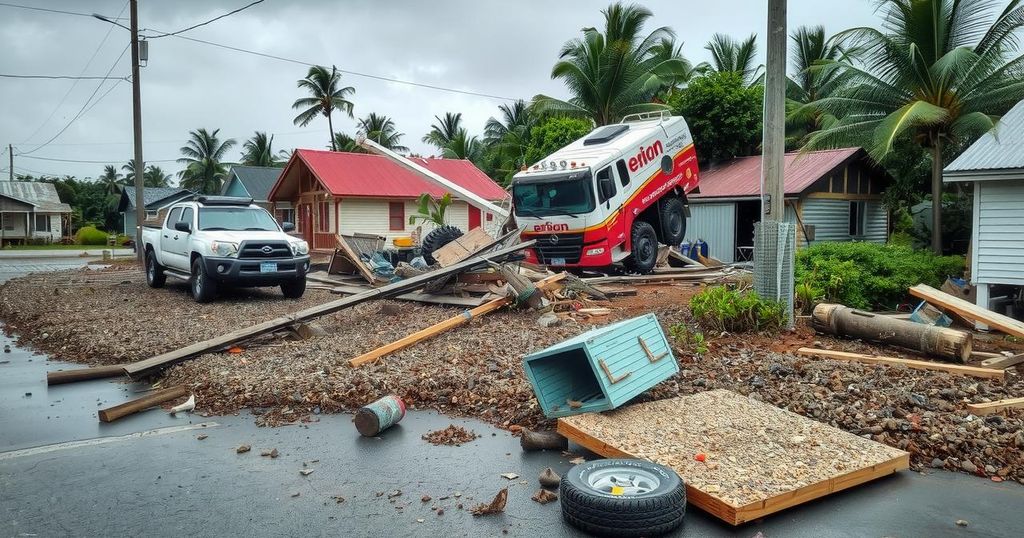Cyclone Chido Devastates Mayotte, Death Toll Estimated in Hundreds
Cyclone Chido struck Mayotte with devastating effect, resulting in hundreds of casualties and widespread destruction. The French government is actively mobilizing rescue efforts and supplies to assist the island’s impoverished population. The cyclone’s path of destruction has raised alarms regarding further impacts in Mozambique and surrounding regions, emphasizing the urgent need for humanitarian support.
The catastrophic impact of Cyclone Chido on the French territory of Mayotte in the Indian Ocean has resulted in a staggering death toll, now estimated at several hundred, with officials cautioning that this figure may rise significantly. Mayotte’s Prefect, François-Xavier Bieuville, indicated that the cyclone has caused unparalleled destruction, arguably the worst experienced in the region in ninety years. The cyclone exacerbated existing vulnerabilities in this financially disadvantaged territory, which has a population exceeding 300,000 individuals residing primarily in poverty-stricken settlements.
Rescue efforts are underway, with France dispatching emergency teams and supplies to address urgent humanitarian needs in Mayotte, where critical damage to infrastructure has hindered rescue operations. Bieuville described the devastation as particularly acute in the informal housing structures, complicating the assessment of casualties. He remarked, “this figure is not plausible when you see the images of the slums.” Currently, he believes the toll might approach “a thousand, or even thousands,” highlighting the cyclone’s extreme impact on an already fragile infrastructure.
Cyclone Chido, classified as a category 4 cyclone, wrought havoc with winds exceeding 220 kph (136 mph). Its destructive path not only impacted Mayotte but also had effects on nearby islands such as Comoros and Madagascar. Subsequently, the storm continued its trajectory to Mozambique, raising alarms regarding further destruction and potential humanitarian crises.
The French government has initiated comprehensive response measures, mobilizing additional police and security personnel to maintain order and prevent looting amidst the chaos. There is an imperative focus on restoring power, providing drinking water, and delivering critical supplies and medical assistance to affected communities. President Emmanuel Macron expressed solidarity with the people of Mayotte, emphasizing the urgency of the government’s response.
As Cyclone Chido continued to move toward Mozambique, UNICEF warned that significant infrastructural damage and social service disruptions were likely, particularly in the Cabo Delgado province where nearly 2 million individuals reside. The looming threat of subsequent health crises, including outbreaks of cholera, dengue fever, and malaria, further complicates the disaster response in the region, as climate change intensifies the frequency and severity of such weather events.
Cyclone Chido has emerged as one of the most devastating cyclones to impact the French territory of Mayotte in nearly a century, causing extensive destruction and loss of life. Mayotte, recognized as one of the poorest territories in France and the European Union, is characterized by informal housing structures that are especially vulnerable to extreme weather conditions. Cyclones pose not only immediate threats from flooding and high winds but also longer-term risks related to public health and infrastructure. The increasing intensity and frequency of such storms are partly attributed to the effects of climate change, necessitating urgent humanitarian responses.
The devastation wrought by Cyclone Chido in Mayotte has highlighted the pressing humanitarian needs of its inhabitants, further complicated by the region’s socioeconomic vulnerabilities. As authorities mobilize resources to respond to the immediate aftermath and potential health crises, the importance of addressing the underlying factors that contribute to the territory’s precarious situation cannot be overstated. The commitment of the French government and international organizations is now crucial in restoring normalcy and safeguarding against future disasters.
Original Source: apnews.com




Post Comment